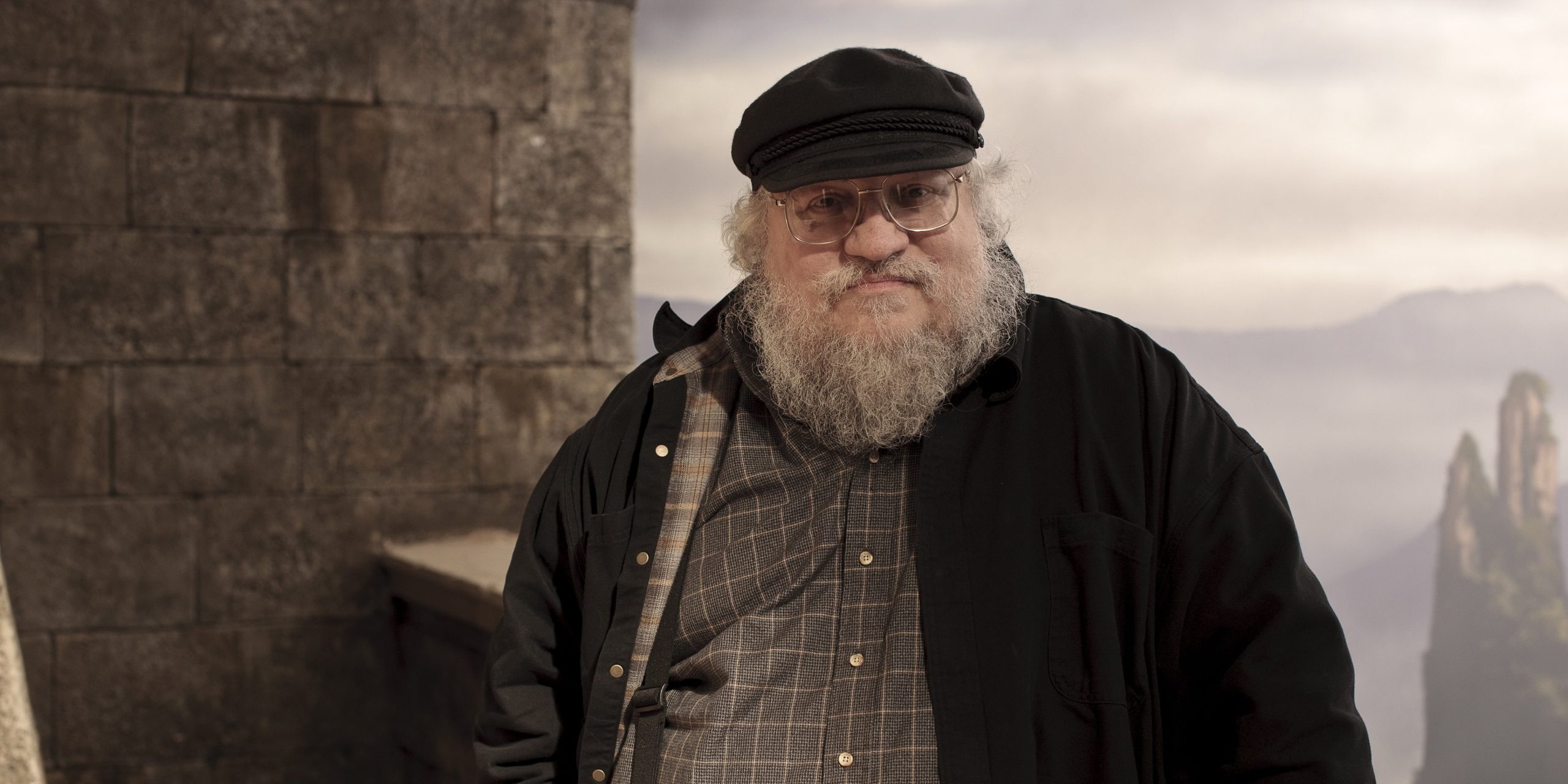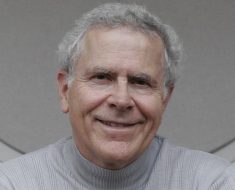
George Raymond Richard Martin net worth is $50 Million. Also know about George Raymond Richard Martin bio, salary, height, age weight, relationship and more …
George Raymond Richard Martin Wiki Biography
George Raymond Richard Martin, commonly known as George R. R. Martin, is a famous American author, screenwriter, as well as a television producer. To the public, George R. R. Martin is perhaps best known for writing an epic fantasy series called “A Song of Ice and Fire”, which currently consists of five books. The first book in the series entitled “A Game of Thrones” was released in 1996 to generally positive critical reviews and commercial success. In addition to its popularity, the novel won him a Locus Award, as well as World Fantasy Award. “A Game of Thrones” has also served as the basis for a popular fantasy drama television series of the same name, in which Martin’s characters are portrayed by such actors as Peter Dinklage, Nikolaj Coster-Waldau, Lena Headey, Emilia Clarke and Kit Harrington among many others. Upon its premiere in 2011, “Game of Thrones” managed to attract the attention of approximately 2.5 million viewers per episode, while the viewership during its second season rose to 11.6 million. The success of the series significantly contributed to the popularity and demand of Martin’s novels, as a result of which his first book in the series became a best-seller in 2011. Currently, George R. R. Martin is working on “The Winds of Winter” and “A Dream of Spring” novels.
A well-known writer, how rich is George R. R. Martin? According to sources, George R. R. Martin’s net worth is estimated to be $50 million, the majority of which he has accumulated due to the popularity of his novels.
George R. R. Martin was born in 1948, in New Jersey, United States. Martin studied at the Mary Jane Donohoe School, and later transferred to Marist High School. Since his childhood, Martin has been interested in writing, and expressed particular interest in comic-books. Consequently, Martin wrote a story entitled “Powerman vs. The Blue Barrier”, which brought him an Alley Award, and inspired him to continue writing. Upon his graduation from high school, he enrolled in the Northwestern University, where he received a degree in Journalism. With George Guthridge’s help, Martin landed the job of a journalism instructor at Clarke University, yet even though he was content with his job, Martin decided to fully dedicate himself to writing. When he was 21 years old, he started writing short stories, which he would later sell to various magazines and newspapers. One of Martin’s first stories sold to a magazine was “The Hero”, which was published in 1971. Two years later, he released “With Morning Comes Mistfall”, which earned him a nomination for a Nebula Award and Hugo Award. A defining moment in Martin’s career came in 1983, after the release of “The Armageddon Rag”, which failed to attract public attention. As a result of this, Martin turned to television and started working as an executive story consultant for the “Twilight Zone” series. However, he did not abandon his literary career, and in 1991 came out with “A Game of Thrones”.
In regards to his personal life, Martin was briefly involved with Lisa Tuttle. He then married Gale Burnick, but they divorced four years later in 1979. Martin is now married to Parris McBride.
IMDB Wikipedia A Game of Thrones A Song of Ice and Fire Associated Press California Clarion Workshop Emilia Clarke Fantasy Gale Burnick Game of Thrones Game of Thrones (TV series) Games George Guthridge George R. R. Martin HBO Kit Harrington Lena Headey Lisa Tuttle Literature Nikolaj Coster-Waldau Parris McBride Peter Dinklage Silicon Valley Veep (TV series) Winter Is Coming World of A Song of Ice and Fire
George Raymond Richard Martin Quick Info
| Full Name | George R. R. Martin |
| Net Worth | $50 Million |
| Salary | $15 million per year |
| Date Of Birth | September 20, 1948 |
| Height | 1.68 m, 1.68 m |
| Profession | Screenwriter, Television producer, Editor, Author, Novelist, Author, Screenwriter, Editor, Novelist, Television producer |
| Education | Northwestern University, Northwestern University |
| Nationality | American, American |
| Spouse | Parris McBride, Gale Burnick, Parris McBride, Gale Burnick |
| Parents | Margaret Brady Martin, Raymond Collins Martin, Margaret Brady Martin, Raymond Collins Martin |
| Siblings | Darleen Martin, Janet Martin, Darleen Martin, Janet Martin |
| http://www.facebook.com/georgerrmartinofficialhttp://www.facebook.com/georgerrmartinofficial | |
| http://www.twitter.com/grrmspeakinghttp://www.twitter.com/grrmspeaking | |
| IMDB | http://www.imdb.com/name/nm0552333/ |
| Awards | Primetime Emmy Award for Outstanding Drama Series, Hugo Award for Best Novella, Hugo Award for Best Short Story, Goodreads Choice Awards Best Fantasy, Hugo Award for Best Novelette, Locus Award for Best Fantasy Novel, Hugo Award for Best Dramatic Presentation, Long Form, Hugo Award for Best Dramatic… |
| Nominations | Hugo Award for Best Novel, Nebula Award for Best Novel, Nebula Award for Best Novella, Locus Award for Best Science Fiction Novel, Nebula Award for Best Short Story, Hugo Award for Best Graphic Story, World Fantasy Award—Novel, Writers Guild of America Award for Television: New Series, Writers Gui… |
| Movies | Atari: Game Over, Doorways, Atari: Game Over, Doorways |
George Raymond Richard Martin Trademarks
- Glasses
- White beard
- Black cap
- His books often feature violence, sexuality, power, religion and moral relativity as major themes
- Famous for abruptly and unexpectedly ‘killing off’ major characters in his books
- The chapters in his books focus on the viewpoints of different characters central to the main storyline
George Raymond Richard Martin Quotes
- [on his namesake, the English record producer George Martin, following his death] I never met Sir George (I did meet Paul McCartney once, for about a minute, while waiting for the valet to bring my rental car up at the Four Seasons in Beverly Hills), but like many millions of others, I loved The Beatles, and Martin’s contribution to their music is worthy of recognition and honor.
- I love comic books and the idea of superheroes. I tried going into writing comics after college. Fortunately, they didn’t hire me, so I was forced to become rich and famous instead.
- Marillion has not been renamed, though I offered to do so. I was tired of people assuming he was named after the band. I had never heard of the band when I named him, though I’ve heard a lot about them since. [Interestingly, the band Marillion were paying tribute to J.R.R. Tolkien’s “The Silmarillion”, another fantasy novel]
- [on the question of whether naming his character, Marillion, was inspired by the British rock band Marillion] I had never heard of the band until the book came out and people pointed it out to me. Perhaps I had heard of them and the name stuck in the back of my mind when I was looking for a name for the singer, but my taste in music runs primarily to ’50s and ’60s rock, the kind of music I talk about in my novel The Armaggeddon Rag. There are homages in the books, tips of the hat to other writers I admire, and occasionally entertainers or icons or pop culture figures just for the hell of it. But Marillion is not one of them. The Three Stooges are in there though, if you can find them!
- When the writing is going really well, whole days and weeks go by, and I suddenly realise I have all these unpaid bills and, my God, I haven’t unpacked, and the suitcase has been sitting there for three weeks.
- Whenever I switch from one character to another, there’s always a few days where I really struggle because I’m changing voices and I’m changing ways of looking at the world. I’m not just flicking a switch; it’s harder process than that.
- Whether you’re a history buff or a fantasy fan, Druon’s epic will keep you turning pages. This was the original game of thrones. If you like ‘A Song of Ice and Fire’, you will love ‘The Accursed Kings’.
- With a book I am the writer and I am also the director and I’m all of the actors and I’m the special effects guy and the lighting technician: I’m all of that. So if it’s good or bad, it’s all up to me.
- You always try to do your own thing. One of the things I wanted to do was to write a book that combines some of the best traits of contemporary fantasy with some of the traits of the historical novel.
- The vast majority of writers out there, they finish their books, and no one cares whether their book is late or ever comes out at all. And then it comes out, and two reviews are published, and it sells 12 copies.
- There are writers, and I know some of them, who are very disciplined. Who write, like, four pages a day, every day. And it doesn’t matter if their dog got run over by a car that day, or they won the Irish sweepstakes. I’m not one of those writers.
- There was part of me that wanted to see the world and travel to distant places, but I could only do it in my imagination, so I read ferociously and imagined things.
- When I am writing best, I really am lost in my world. I lose track of the outside world. I have a difficult time balancing between my real world and the artificial world.
- When I’m writing from a character’s viewpoint, in essence I become that character; I share their thoughts, I see the world through their eyes and try to feel everything they feel.
- One of the big breakthroughs, I think for me, was reading Robert A. Heinlein’s four rules of writing, one of which was, ‘You must finish what you write.’ I never had any problem with the first one, ‘You must write’ – I was writing since I was a kid. But I never finished what writing.
- Over the years, more than one reviewer has described my fantasy series, ‘A Song of Ice and Fire’, as historical fiction about history that never happened, flavoured with a dash of sorcery and spiced with dragons. I take that as a compliment.
- Start with short stories. After all, if you were taking up rock climbing, you wouldn’t start with Mount Everest. So if you’re starting fantasy, don’t start with a nine-book series.
- The distinction between literary and genre fiction is stupid and pernicious. It dates back to a feud between Robert Louis Stevenson and Henry James. James won, and it split literature into two streams. But it’s a totally false dichotomy.
- The prejudice is still there, but it’s breaking down. You have writers like Michael Chabon and The Yiddish Policemen’s Union. He’s a writer who’s determined to break down genre barriers. He’s done amazing things.
- It’s like these ideas, these characters, kind of bubble up inside me, and one day they’re not there, and the next day they are there. They’re alive, and they’re whispering in my head and all that stuff, and I want to write about those things.
- It’s really irritating when you open a book, and 10 pages into it you know that the hero you met on page one or two is gonna come through unscathed, because he’s the hero. This is completely unreal, and I don’t like it.
- Many writers will get a contract by selling chapters and outlines or something like that. I wrote the entire novel, and when it was all finished, I would give it to my agent and say, ‘Well, here’s a novel; sell it if you can.’ And they would do that, and it was good because I never had anyone looking over my shoulder.
- My characters who come back from death are worse for wear. In some ways, they’re not even the same characters anymore. The body may be moving, but some aspect of the spirit is changed or transformed, and they’ve lost something.
- Nothing bores me more than books where you read two pages and you know exactly how it’s going to come out. I want twists and turns that surprise me, characters that have a difficult time and that I don’t know if they’re going to live or die.
- I’ve been many kinds of writers in my career: novelist; tele-playwright; short story writer. As a high-school student, I wrote amateur pieces for fanzines, and I’ve written for Hollywood.
- If I was a soldier going to war, I’d be pretty scared the night before a battle. It’s a scary thing. And I want my readers to feel that fear as they turn the page.
- If you go all the way back, I’ve always written science-fiction, I’ve always written fantasy, I’ve always written horror stories and monster stories, right from the beginning of my career. I’ve always moved back and forth between the genres. I don’t really recognise that there’s a significant difference between them in some senses.
- If you’re going to write about war, which my books are about, wars are nasty things. I think it’s sort of a cheap, easy way out to write a war story in which no one ultimately dies.
- In my 10 years that I spent out in TV and film, I had my shares of frustrations and annoyances and disappointments, but also I think it was, in the long run, it was very good for me in a whole bunch of ways.
- I try to make the readers feel they’ve lived the events of the book. Just as you grieve if a friend is killed, you should grieve if a fictional character is killed. You should care. If somebody dies and you just go get more popcorn, it’s a superficial experience isn’t it?
- I was a novelist first. But in the mid-’80s, I did work in television for ten years. And yes, that was frequently the reaction to my scripts. People would say, ‘You know, George, this is great. We love it, a terrific script, but it would cost five times our budget to shoot this.’
- I write from this tight third-person viewpoint, where each chapter is seen through the eyes of one individual character. When I’m writing that character, I become that character and identify with that character.
- I’m a huge fan of Tolkien. I read those books when I was in junior high school and high school, and they had a profound effect on me. I’d read other fantasy before, but none of them that I loved like Tolkien.
- I’ve always preferred writing about grey characters and human characters. Whether they are giants or elves or dwarves, or whatever they are, they’re still human, and the human heart is still in conflict with the self.
- I have many books that I want to write; I’d like to think that I’ll be around for another 20 years or so and write another dozen novels, probably some sort of imaginative literature… Never again another seven-volume saga.
- I knew that, when writing a book, you’re not constrained by a budget. You’re not constrained by what you can do, in terms of the special effects technology. You’re not limited to any particular running time.
- I never liked Gandalf the White as much as Gandalf the Grey, and I never liked him coming back. I think it would have been an even stronger story if Tolkien had left him dead.
- I think in television and film, it’s not usually the child’s point of view. It’s the story of an adult. If there’s a child in a drama or an action-adventure movie, they’re someone who needs to be saved, someone who needs to be protected, or if they’re killed, someone who needs to be avenged. Their character doesn’t matter much.
- I think that, in all of my time, I got just one fan letter, from an NFL fullback named Darian Barnes. NFL players might not have enough time for my books.
- I grew up with four T.V. channels. If you missed a show, you missed it. You gotta wait a week for the next one. I’d mail-order books: take a quarter, get an envelope, send off for it and wait until it arrived. I grew up waiting for things.
- I had an encyclopedia with a list of flags in the back, so I would look at all these flags of China and Liberia and England and Denmark and whatever, and I learned all the different flags, and I tried to imagine what it would be like to be voyaging on some of these ships.
- I had this desire to see the world. I couldn’t see any of it, but I saw it in my imagination, and that’s why I always read books, and I could go to Mars or Middle Earth or the Hyborian age.
- I have done a lot of work in Hollywood myself. I worked in television for roughly 10 years, from the mid-’80s to mid-’90s. And I was on staff at a couple of shows. I did some feature films, including originals and adaptations.
- I have files, I have computer files and, you know, files on paper. But most of it is really in my head. So God help me if anything ever happens to my head!
- I believe that a writer learns from every story he writes, and when you try different things, you learn different lessons. Working with other writers, as in Hollywood or in a shared world series, will also strengthen your skills, by exposing you to new ways of seeing the work, and different approaches to certain creative challenges.
- I can see a scene in my head, and when I try to get it down in words on paper, the words are clunky; the scene is not coming across right. So frustrating. And there are days where it keeps flowing. Open the floodgates, and there it is. Pages and pages coming. Where the hell does this all come from? I don’t know.
- I do get invitations all of the time to play actual fantasy football, by the way, but I get the feeling that I’d like it too much. I have enough demands on my time. My fans would kill me.
- I don’t know if I have any particular views about women in positions of power, though I do think it’s more difficult for women, particularly in a Medieval setting. They have the additional problem that they’re a woman and people don’t want them in a position of power in an essentially patriarchal society.
- I find religion and spirituality fascinating. I would like to believe this isn’t the end and there’s something more, but I can’t convince the rational part of me that that makes any sense whatsoever.
- You want people to be eager for your book; the downside is when the people forget the series even exists.
- As Faulkner says, all of us have the capacity in us for great good and for great evil, for love but also for hate. I wanted to write those kinds of complex character in a fantasy, and not just have all the good people get together to fight the bad guy.
- Boy, there are days where I get up and say ‘Where the hell did my talent go? Look at this crap that I’m producing here. This is terrible. Look, I wrote this yesterday. I hate this, I hate this.’
- ‘Dreamsongs’ allows me to show the scope of my writing – with personal commentary that puts the works in context and includes some autobiographical details intended to reveal how each piece came to be, what it represents, and how it has formed, or been informed by, my philosophy of writing.
- Fiction is lies; we’re writing about people who never existed and events that never happened when we write fiction, whether its science fiction or fantasy or western mystery stories or so-called literary stories. All those things are essentially untrue. But it has to have a truth at the core of it.
- There is magic in my universe, but it’s pretty low magic compared to other fantasies.
- Unfortunately in television, for whatever reason, fantasy became thought of as a kids’ genre.
- Writing is hard. I mean, I sit there and work at it.
- Yes – 90% of fantasy is crap. And so is 90% of science fiction and 90% of mystery fiction and 90% of literary fiction.
- You can have the power to destroy, but it doesn’t give you the power to reform, or improve, or build.
- ‘Rome’ was one of my favourite shows, and I wish HBO had given it three more seasons ’cause I would have loved to continue watching it.
- The cable makers are the ones who are willing to take risks and do something original and push the envelope some.
- The success that the Tolkien books had redefined modern fantasy.
- There are some examples of medieval kings who were terrible human beings but were nevertheless good kings.
- There has to be a level of joy of what you’re doing.
- I’ve said in many interviews that I like my fiction to be unpredictable. I like there to be considerable suspense.
- I’ve written some standalone novels, but a book series allows fans in. There’s much more intense involvement.
- Nobody is a villain in their own story. We’re all the heroes of our own stories.
- One of the great things about books is you can afford to do anything.
- One of the things I love, and I’m a voracious reader as well as a writer, is books that surprise me, that are not predictable.
- I worked out of Hollywood for 10 years and I had my heart broken half a dozen times, so I know all the things that can go wrong.
- I wrote six pilots, none of which ever got picked up. When you stop trying, it then it falls in your lap.
- I’m one of those writers who say, ‘I’ve enjoy having written.’
- I’ve never been a fast writer.
- I’ve never been good with deadlines. My early novels, I wrote by myself. No one knew I was writing a novel; I didn’t have a contract.
- I spent a whole summer working on what proved to be ‘A Game of Thrones’.
- I suppose I’m a lapsed Catholic. You would consider me an atheist or agnostic.
- I tend to write one character at a time. But I don’t write the entirety of one character at a time.
- I wanted to write a big novel, something epic in scale.
- I watch NFL football on Sundays. I enjoy gaming with friends, meaning role-playing games; I still enjoy going to conventions and traveling.
- I have some other novels I want to write. I have a lot of short stories – I love the short story.
- I know some writers can write on the road, but I’m not one of them.
- I like grey characters; fantasy for too long has been focused on very stereotypical heroes and villains.
- I love fantasy. I grew up reading fantasy.
- I prefer to work with grey characters rather than black and white.
- I have a huge emotional attachment to characters I’ve created, especially the viewpoint characters.
- I have always been a dark writer.
- I have always regarded historical fiction and fantasy as sisters under the skin, two genres separated at birth.
- I have an instinctual distrust of conventional happy endings.
- I have idea files of books that I want to write one of these days, stories I want to write one of these days, but I’ll probably never get to them.
- I work for two years on a book and it comes out and two days later I’ve got my first e-mail: When is the next one coming out?
- The odd thing about being a writer is you do tend to lose yourself in your books. Sometimes it seems like real life is flickering by and you’re hardly a part of it. You remember the events in your books better than you remember the events that actually took place when you were writing them.
- Of course it’s not enough to be a good man to be an effective ruler and it never has been.
- An awful lot of fantasy, and even some great fantasy, falls into the mistake of assuming that a good man will be a good king, that all that is necessary is to be a decent human being and when you’re king everything will go swimmingly.
- A lot of writing takes place in the subconscious, and it’s bound to have an effect.
- All fiction has to have a certain amount of truth in it to be powerful.
- As much as I love historical fiction, my problem with historical fiction is that you always know what’s going to happen.
- Believe it or not, I worked four summers in college as a sports writer covering baseball for a parks and rec department in Bayonne, N.J.
- Don’t write outlines; I hate outlines.
- I had a couple of friends, but I was mostly the kid with his nose in a book.
- [on writing ‘The Red Wedding’ in A Storm of Swords] That was the hardest scene I’ve ever had to write. It’s two-thirds of the way through the book, but I skipped over it when I came to it. So the entire book was done and there was still that one chapter left. Then I wrote it. It was like murdering two of your children. I try to make the readers feel they’ve lived the events of the book. Just as you grieve if a friend is killed, you should grieve if a fictional character is killed. You should care. If somebody dies and you just go get more popcorn, it’s a superficial experience isn’t it?
- [when asked if any of the cast of his book series, “A Song of Ice and Fire”, will be left alive, he joked]: “No one will be alive by the last book. In fact, they all die in the fifth. The sixth book will be just a thousand-page description of snow blowing across the graves …”
George Raymond Richard Martin Important Facts
- When the Beatles manager George Martin died, George R R Martin fans panicked and thought George R R Martin had died and he had to make an announcement that he was still alive.
- Mentioned in the song “George RR Martin please write and write faster” by Paul & Storm.
- Lives in the same Santa Fe house he’s resided in since the 1970s, and bought a second house on the same street to function as his office and library.
- In the very first Comic-Con that was conducted in New York city in 1964, George was the very first person who signed up to enter the convention.
- He is spoofed by Trey Parker on the South Park (1997) episodes titled ‘A Song of Ass and Fire’ and ‘Titties and Dragons’.
- An interviewer once commented on George R. R. Martin’s female characters being individual and realistic and then asked “Where do you think that comes from?” Sounding a little puzzled, George R. R. Martin replied, “Well, I’ve always thought of women as people.”.
- Does all of his writing on a DOS word processor using WordStar 4.0, a program released in 1987.
- Lifelong supporter of The Democratic party.
- He is of Italian, Irish, German, English and French ancestry.
- He owns the first issues of “The Amazing Spider-man” and “Fantastic Four”.
- Collects comic books.
- Is a close friend of fellow screenwriter Melinda Snodgrass.
- Lives in New Mexico.
- Stated at the 2011 San Diego Comic Convention that his favorite character in “A Song of Ice and Fire” is Tyrion Lannister.
- Editor of the Wild Cards shared world series.
- Enjoys role-playing games.
- His fantasy series “A Song of Ice and Fire” is set to be adapted as a television series by Home Box Office (the first one being Game of Thrones (2011)), with each novel (most of which are over 1,000 pages) being produced as an entire season.
- His novelette “Sandkings” won a 1980 Hugo Award.
- His short story “The Way of Cross and Dragon” won a 1980 Hugo Award.
- Wrote the teleplay of The Twilight Zone (1985) episode “Last Defender of Camelot,” which written by his friend Roger Zelazny.
- Close friend of the late author Roger Zelazny.
George Raymond Richard Martin Filmography
| Title | Year | Status | Character | Role |
|---|---|---|---|---|
| Game of Thrones | TV Series based on “A Song of Ice and Fire” by – 67 episodes, 2011 – 2017 written for television by – 2 episodes, 2013 – 2014 written by – 2 episodes, 2011 – 2012 | Writer | ||
| Game of Thrones: A Telltale Games Series | 2014 | Video Game novels | Writer | |
| Les Insultes dans Game of Thrones | 2014 | Short characters | Writer | |
| School of Thrones | 2013 | TV Series characters – 3 episodes | Writer | |
| Game of Thrones Ascent | 2013 | Video Game | Writer | |
| Game of Thrones | 2012 | Video Game | Writer | |
| The Outer Limits | TV Series novella “Sandkings” – 1 episode, 2000 novella – 1 episode, 1995 | Writer | ||
| Doorways | 1993 | TV Movie | Writer | |
| Beauty and the Beast | TV Series written by – 11 episodes, 1987 – 1990 story – 2 episodes, 1989 teleplay – 2 episodes, 1989 | Writer | ||
| Nightflyers | 1987 | novella | Writer | |
| The Twilight Zone | TV Series teleplay by – 4 episodes, 1986 written by – 1 episode, 1986 | Writer | ||
| The Hitchhiker | 1984 | TV Series short story – 1 episode | Writer | |
| Game of Thrones | 2011-2018 | TV Series co-executive producer – 66 episodes | Producer | |
| Game of Thrones | 2012 | Video Game executive producer | Producer | |
| Doorways | 1993 | TV Movie executive producer | Producer | |
| Beauty and the Beast | TV Series producer – 27 episodes, 1988 – 1989 co-supervising producer – 10 episodes, 1989 – 1990 | Producer | ||
| The Outer Limits | 1995 | TV Series consultant – 1 episode | Miscellaneous | |
| Beauty and the Beast | 1987 | TV Series executive story consultant – 8 episodes | Miscellaneous | |
| The Twilight Zone | 1986-1987 | TV Series story editor – 4 episodes | Miscellaneous | |
| Fantastic Forum | 2016 | TV Series | Actor | |
| Z Nation | 2015 | TV Series | George R.R. Martin | Actor |
| Sharknado 3: Oh Hell No! | 2015 | TV Movie | George R.R. Martin | Actor |
| Gay of Thrones | 2014 | TV Series | George R.R. Martin | Actor |
| Robot Chicken | 2014 | TV Series | George R.R. Martin / Father | Actor |
| Fargo | 1996 | Bar Person (uncredited) | Actor | |
| Beauty and the Beast | 1988 | TV Series | Restaurant Patron | Actor |
| Game of Thrones | 2013-2014 | TV Series writer – 3 episodes | Soundtrack | |
| Game of Thrones: A Telltale Games Series | 2014 | Video Game very special thanks | Thanks | |
| Atari: Game Over | 2014 | Documentary special thanks | Thanks | |
| Marvel Studios: Assembling a Universe | 2014 | TV Movie documentary thanks | Thanks | |
| Seelenjäger | 2014 | Short inspired by | Thanks | |
| Black News | 2013 | TV Series thanks – 1 episode | Thanks | |
| Eve Angelic | 2013 | Short special thanks | Thanks | |
| The Callback Queen | 2013 | thanks | Thanks | |
| The 68th Primetime Emmy Awards | 2016 | TV Special | Himself | Self |
| Neil Gaiman: Dream Dangerously | 2016 | Documentary | Himself | Self |
| Chalkskin 10 | 2016 | TV Series | Himself | Self |
| The 67th Primetime Emmy Awards | 2015 | TV Special | Himself – Co-Winner: Outstanding Drama Series | Self |
| The South Bank Show | 2015 | TV Series documentary | Himself | Self |
| Supreme Tweeter | 2015 | TV Series | Himself | Self |
| Teens Wanna Know | 2015 | TV Series | Himself | Self |
| Atari: Game Over | 2014 | Documentary | Himself – Writer, Game of Thrones | Self |
| La grande librairie | 2014 | TV Series | Himself | Self |
| Late Night with Seth Meyers | 2014 | TV Series | Himself | Self |
| Last Week Tonight with John Oliver | 2014 | TV Series | Himself | Self |
| Conan | 2013-2014 | TV Series | Himself – Guest | Self |
| KRQE News 13 | 2014 | TV Series | Himself | Self |
| Marvel Studios: Assembling a Universe | 2014 | TV Movie documentary | Himself | Self |
| Imagine | 2013 | TV Series documentary | Himself | Self |
| Comic Con 2012 Live | 2012 | TV Movie | Himself | Self |
| Sword & Laser | 2012 | TV Series | Himself – Guest | Self |
| The Hour | 2012 | TV Series | Himself | Self |
| Making of Game of Thrones | 2011 | Video documentary | Himself | Self |
| Game of Thrones: Inside the Night’s Watch | 2011 | Video documentary | Himself | Self |
George Raymond Richard Martin Awards
| Year | Award | Ceremony | Nomination | Movie | Category |
|---|---|---|---|---|---|
| 2016 | Primetime Emmy | Primetime Emmy Awards | Outstanding Drama Series | Game of Thrones (2011) | Won |
| 2015 | Primetime Emmy | Primetime Emmy Awards | Outstanding Drama Series | Game of Thrones (2011) | Won |
| 2013 | Hugo | Hugo Awards | Best Dramatic Presentation – Short Form | Game of Thrones (2011) | Won |
| 2012 | Hugo | Hugo Awards | Best Dramatic Presentation – Long Form | Game of Thrones (2011) | Won |
| 2016 | Primetime Emmy | Primetime Emmy Awards | Outstanding Drama Series | Game of Thrones (2011) | Nominated |
| 2015 | Primetime Emmy | Primetime Emmy Awards | Outstanding Drama Series | Game of Thrones (2011) | Nominated |
| 2013 | Hugo | Hugo Awards | Best Dramatic Presentation – Short Form | Game of Thrones (2011) | Nominated |
| 2012 | Hugo | Hugo Awards | Best Dramatic Presentation – Long Form | Game of Thrones (2011) | Nominated |





